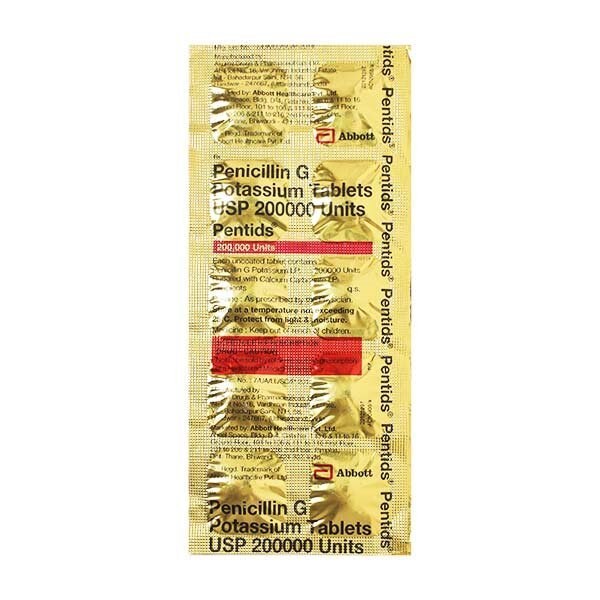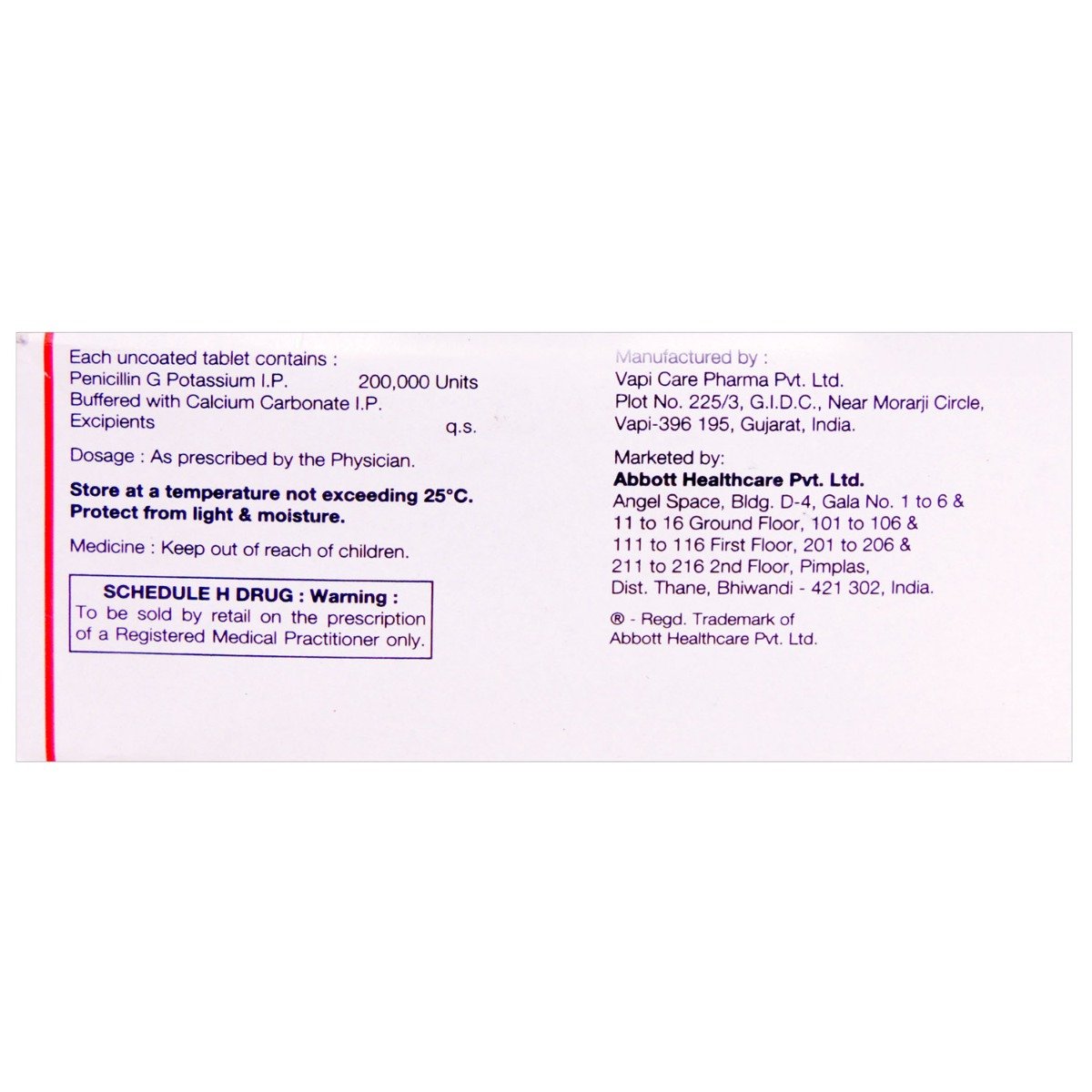Pentids 200000IU Tablet


MRP ₹15.5
(Inclusive of all Taxes)
₹2.3 Cashback (15%)
know your delivery time
Provide Delivery Location
Composition :
Manufacturer/Marketer :
Consume Type :
Expires on or after :
Return Policy :
Selected Pack Size:10
10 ₹14
(₹1.4 per unit)
In Stock
6 ₹8.1
(₹1.35 per unit)
Out of stock

Secure Payment

Trusted by 8 Crore Indians

Genuine Products
Therapeutic Class
Country of origin
Manufacturer/Marketer address
Author Details
We provide you with authentic, trustworthy and relevant information
Disclaimer
Alcohol
Safe if prescribed
Avoid alcohol consumption while taking Pentids 200000IU Tablet to prevent unpleasant side effects, such as stomach upset, nausea, and vomiting.
Pregnancy
Consult your doctor
Pentids 200000IU Tablet should be cautiously used under medical guidance during pregnancy. Please consult your doctor before taking Pentids 200000IU Tablet if you are pregnant or planning to conceive.
Breast Feeding
Consult your doctor
Penicillin is excreted into the breast milk and may harm a nursing baby. Please consult your doctor before taking Pentids 200000IU Tablet if you are breastfeeding.
Driving
Safe if prescribed
It is unknown whether Pentids 200000IU Tablet affects your ability to drive and operate machinery. Drive only if you are physically stable and mentally focused.
Liver
Consult your doctor
Let your doctor know if you have any history of liver diseases before taking Pentids 200000IU Tablet . Your doctor will prescribe Pentids 200000IU Tablet only if the benefits outweigh the risk.
Kidney
Consult your doctor
If you have any history of kidney diseases before taking Pentids 200000IU Tablet , please inform your doctor. Your doctor will prescribe Pentids 200000IU Tablet only if the benefits outweigh the risk.
Children
Safe if prescribed
Pentids 200000IU Tablet should be given to children only when prescribed by the doctor.
About Pentids 200000IU Tablet
Pentids 200000IU Tablet belongs to the 'antibiotics' class of drugs, primarily used to treat bacterial infections of the respiratory tract, throat, lungs, nose, and skin. It is useful in treating streptococci and staphylococci infections, diphtheria, meningitis, gonorrhoea, and syphilis. Bacterial infection occurs when harmful bacteria grow in the body and causes illness. It can infect any part of the body and multiply very quickly.
Pentids 200000IU Tablet contains Penicillin G Potassium, an antibacterial agent. It has bactericidal (ability to kill bacteria) activity against gram-positive and gram-negative aerobic (requires oxygen to survive) and anaerobic (survives with little or no oxygen) bacteria. Pentids 200000IU Tablet acts by binding to the penicillin-binding proteins (PBPs) inside the bacterial cell wall and inhibits its cell wall synthesis.
Your doctor will advise the dose and duration based on the severity of your infection. Pentids 200000IU Tablet may cause side effects, although not everybody gets them. Common side effects of Pentids 200000IU Tablet include stomach pain, headache, nausea, vomiting, diarrhoea, skin rash, yellow-coloured eyes and skin, weakness, and muscle/joint pain. If any of these effects persist or worsen, please seek medical advice promptly.
Brief your medical history to the doctor if you have any allergic reactions to antibiotics. Please inform your doctor if you have any liver/kidney/heart diseases and asthma before using Pentids 200000IU Tablet . Do not use this medicine while having vaccinations with live bacterial vaccines (typhoid vaccine) since Pentids 200000IU Tablet may affect the vaccines' activity. Consult your doctor if you are pregnant or breastfeeding before taking Pentids 200000IU Tablet . Drinking alcohol may lead to unwanted side effects while using Pentids 200000IU Tablet ; hence please limit or avoid alcohol intake. Pentids 200000IU Tablet should be used in children only when the doctor has prescribed it.
Uses of Pentids 200000IU Tablet
Medicinal Benefits Mweb
Key Benefits
Pentids 200000IU Tablet contains Penicillin G Potassium, which belongs to the class of antibiotics. It has a bactericidal action against gram-positive and gram-negative aerobic and anaerobic bacteria. It acts by binding to the penicillin-binding proteins (PBPs) inside the bacterial cell wall and inhibits its cell wall synthesis. This process further leads to cell lysis or death. Thus, Pentids 200000IU Tablet helps treat various bacterial infections.
Directions for Use
Side Effects of Pentids 200000IU Tablet
- Stomach pain
- Headache
- Nausea
- Vomiting
- Diarrhoea
- Weakness
- Muscle/joint pain
Drug Warnings
If you have a history of asthma, kidney disease, stomach problems (nausea, vomiting, digestive issues), and heart or liver diseases, please inform your doctor before taking Pentids 200000IU Tablet . Clostridium difficile-associated diarrhoea (CDAD) is reported during the usage of antibiotics like Pentids 200000IU Tablet . Therefore, please undergo an examination to rule out the chances of CDAD if you experience diarrhoea following Pentids 200000IU Tablet therapy. Let your doctor know if you are undergoing any vaccinations with live bacterial vaccines (like typhoid vaccine) since Pentids 200000IU Tablet may affect vaccines' activity. Please seek medical advice if you are pregnant or breastfeeding before taking Pentids 200000IU Tablet . Drinking alcohol may lead to unwanted side effects while using Pentids 200000IU Tablet ; hence please limit or avoid alcohol intake. Pentids 200000IU Tablet should be used in children only when the doctor has prescribed it.
Drug-Drug Interactions
Drug-Drug Interactions
Login/Sign Up
Co-administration of Pentids 200000IU Tablet with Methotrexate may increase the risk or severity of side effects.
How to manage the interaction:
Although there is an interaction, Methotrexate can be taken with Pentids 200000IU Tablet if prescribed by the doctor. Consult the prescriber if you experience any symptoms such as fatigue, dizziness, fainting, unusual bleeding or bruising, fever, chills, sore throat, or body aches. Contact a doctor immediately. Do not stop using any medications without consulting to a doctor.
The therapeutic efficacy of BCG vaccine can be decreased when used in combination with Pentids 200000IU Tablet.
How to manage the interaction:
Although there is an interaction, BCG vaccine can be taken with Benylpenicillin if prescribed by the doctor. The doctor may advise dose adjustment or more frequent monitoring to safely use both medications.
Drug-Food Interactions
Drug-Food Interactions
Login/Sign Up
Drug-Diseases Interactions
Drug-Diseases Interactions
Login/Sign Up
Colitis: In some cases use of Pentids 200000IU Tablet may cause ranging from mild diarrhea to fatal colitis. Colitis is commonly Clostridioides difficile-associated diarrhea (CDAD). Discontinue therapy if signs or CDAD is confirmed.
How to manage the interaction:
Discontinue benzylpencillin and consult the prescriber if you experince watery diarrhoea, abdominal pain, dehydration, fever, and nausea. Appropriate fluid and electrolyte management, protein supplementation, and antibacterial treatment of C difficile is advised.
Use Pentids 200000IU Tablet with caution in patients with history of allergies and/or asthma.
How to manage the interaction:
Pentids 200000IU Tablet should be used with caution in individuals with a history of significant allergies and/or asthma.
Drug-Drug Interactions Checker List
- WARFARIN
- METHOTREXATE
- ASPIRIN
- INDOMETHACIN
- CHLORAMPHENICOL
- TETRACYCLINE
Habit Forming
Special Advise
- Your doctor may advise renal, hepatic, and blood function tests during therapy.
- Penicillin antibiotics are easily removed during dialysis; hence let your doctor know if you are undergoing dialysis treatment so that the dose can be scheduled after the dialysis.
- Pentids 200000IU Tablet may also affect urine glucose tests; hence inform your doctor beforehand if you are using Pentids 200000IU Tablet .
Diet & Lifestyle Advise
- Include whole-grain foods like multigrain bread and brown rice in your diet.
- Taking probiotics after an antibiotic treatment reduces the risk of antibiotic-associated diarrhoea. Try taking yoghurt, cheese, sauerkraut, and kimchi as they help restore the intestine's good bacteria.
- Include more fibre-enriched food in your diet that is easily digested by your gut bacteria. Fibre foods may also help restore healthy gut bacteria after a course of antibiotics.
- Avoid intake of alcoholic beverages as they can make you dehydrated and affect your sleep.
- Manage stress, eat healthily, drink plenty of water, exercise regularly, and get plenty of sleep.
Buy best Infections & Infestation products by
Cipla Ltd
Macleods Pharmaceuticals Ltd
Alkem Laboratories Ltd
Lupin Ltd
Abbott India Ltd
Sun Pharmaceutical Industries Ltd
Mankind Pharma Pvt Ltd
Micro Labs Ltd
Aristo Pharmaceuticals Pvt Ltd
FDC Ltd
Intas Pharmaceuticals Ltd
Glenmark Pharmaceuticals Ltd
Ipca Laboratories Ltd
Torrent Pharmaceuticals Ltd
Zydus Healthcare Ltd
Biochem Pharmaceutical Industries Ltd
Zuventus Healthcare Ltd
United Biotech Pvt Ltd
Hetero Drugs Ltd
Emcure Pharmaceuticals Ltd
Alembic Pharmaceuticals Ltd
Indoco Remedies Ltd
Fusion Health Care Pvt Ltd
Dr Reddy's Laboratories Ltd
Leeford Healthcare Ltd
Cadila Healthcare Ltd
Wockhardt Ltd
Zydus Cadila
GlaxoSmithKline Pharmaceuticals Ltd
Morepen Laboratories Ltd
Blue Cross Laboratories Pvt Ltd
Cadila Pharmaceuticals Ltd
Converge Biotech Pvt Ltd
Elder Pharmaceuticals Ltd
Hetero Healthcare Pvt Ltd
Pfizer Ltd
AAA Pharma Trade Pvt Ltd
Gufic Bioscience Ltd
Mylan Pharmaceuticals Pvt Ltd
Corona Remedies Pvt Ltd
Wallace Pharmaceuticals Pvt Ltd
Apex Laboratories Pvt Ltd
Medishri Healthcare Pvt Ltd
Akumentis Healthcare Ltd
Alniche Life Sciences Pvt Ltd
Hegde & Hegde Pharmaceutica Llp
Veritaz Healthcare Ltd
Ranbaxy Laboratories Ltd
Koye Pharmaceuticals Pvt Ltd
Shreya Life Sciences Pvt Ltd
Overseas Health Care Pvt Ltd
Biocon Ltd
Indchemie Health Specialities Pvt Ltd
Medley Pharmaceuticals Ltd
Brinton Pharmaceuticals Ltd
J B Chemicals & Pharmaceuticals Ltd
Unifaith Biotech Pvt Ltd
Ajanta Pharma Ltd
Biochemix Health Care Pvt Ltd
Natco Pharma Ltd
Samarth Life Sciences Pvt Ltd
Unichem International
Laborate Pharmaceuticals India Ltd
Unipark Biotech Pvt Ltd
Zymes Bioscience Pvt Ltd
Indiabulls Pharmaceuticals Pvt Ltd
Neon Laboratories Ltd
Vasu Organics Pvt Ltd
DR Johns Lab Pharma Pvt Ltd
East West Pharma India Pvt Ltd
La Renon Healthcare Pvt Ltd
Medgen Drugs And Laboratories Pvt Ltd
Novartis India Ltd
Canixa Life Sciences Pvt Ltd
Icarus Health Care Pvt Ltd
Lincoln Pharmaceuticals Ltd
Celon Laboratories Pvt Ltd
Concept Pharmaceuticals Ltd
Klm Laboratories Pvt Ltd
Nicholas Piramal India Ltd
Systopic Laboratories Pvt Ltd
Yuventis Pharmaceuticals
Capital Pharma
German Remedies Ltd
Pristine Pearl Pharma Pvt Ltd
Unison Pharmaceuticals Pvt Ltd
Aurz Pharmaceutical Pvt Ltd
Clover Health Care Pharma
Kepler Healthcare Pvt Ltd
Allites Life Sciences Pvt Ltd
Auspharma Pvt Ltd
Intra Life Pvt Ltd
Jolly Healthcare
Linux Laboratories Pvt Ltd
Ozone Pharmaceuticals Ltd
Cachet Pharmaceuticals Pvt Ltd
Comed Chemicals Ltd
Delcure Life Sciences Ltd
Fresenius Kabi India Pvt Ltd
Khandelwal Laboratories Pvt Ltd
Frequently Bought Together
Customers Also Bought


_0.jpg?tr=q-85)





